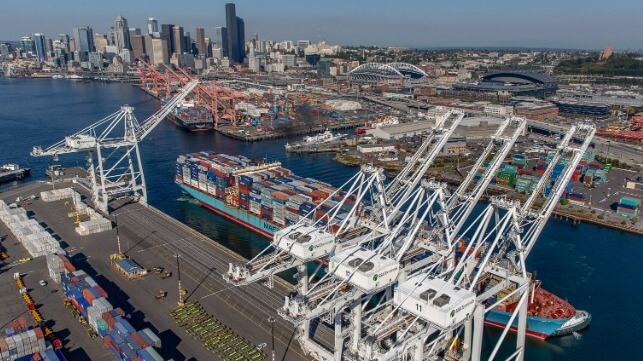NLRB Rules Against ILWU in Dispute Stemming from Automation Agreements

The U.S.’s National Labor Relations Board (NLRB) ruled against the International Longshore and Warehouse Union and its local in what it terms a jurisdictional dispute over the assignment of work at Seattle’s Terminal 5. While it is a narrow issue applying to one terminal in Seattle, observers believe it could have broader implications in the ongoing collective bargaining negotiations for the master contract covering longshore work at the West Coast’s 29 seaports. The case likely was overhanging the contract negotiations.
Charged with overseeing the enforcement of U.S. labor law as well as settling these types of disputes through arbitration, the NLRB published the decision on April 6 affirming a March 2022 judge’s ruling, findings, and conclusions that rejected the arguments of the ILWU that its members should be doing certain tasks at Terminal 5.
The NLRB delegated its authority in this case to a three-member panel that after reviewing the case agreed with the judge’s ruling that the ILWU failed to establish a legitimate work-preservation defense. The ruling says that the ILWU “has engaged in unfair labor practices,” and orders the union to “cease and desist from threatening, coercing or restraining SSA Marine (operators of Terminal 5) to assign work to members of the International Association of Machinists and Aerospace Workers (IAM) instead of ILWU or ILWU Local 19 members.
The ILWU filed its claims in September 2020 and November 2020 arguing that the work in question under the 2019 contract had to be assigned to its members. At issue were maintenance and repair work and specifically tasks related to the use of cold ironing shore power at Terminal 5.
Commenting on the NLRB ruling, Cam Williams, ILWU Coast Committeeman, said “The ILWU is confident that the NLRB decision, which cannot go into effect without court approval, will on appeal be overturned as legally wrong. The ILWU expects that the companies signatory to its collective bargaining agreement abide by the terms of the contract they negotiated.”
The case delves into the minutia of the history of the labor agreements and how they evolved in response first to containerization and then automation. In 1978, the ILWU and Pacific Maritime Association (PMA) agreed that maintenance work on containers and cargo handling equipment would be performed by ILWU represented workers. Thirty years later in exchange for the right to automate and introduce new technologies, the PMA agreed in 2008 to assign additional maintenance and repair work to the ILWU.
Historically Terminal 5 had used IAM members until American President Lines vacated the facility in 2014. Four years later, the Northwest Seaport Alliance leased the terminal and used ILWU represented mechanics to perform a limited amount of work during the modernization of the terminal in 2018 and 2019. The IAM took action in 2019 to have the work assigned to its members with a 2020 decision finding for the IAM.
“The board concluded that the factors of employer preference, past practice, skills and training, and economic efficiency of operations favored an award of the disputed work to IAM, while the current assignment of work and job loss favored an award to ILWU represented employees.” They tempered their decision by saying the work was being awarded to employees represented by the IAM and not the IAM.
The work-preservation defense of the ILWU was rejected based on the long-held principles of the NLRB that the defense only applies when the work was previously done by the union’s employees. The board strongly rejects using the defense to expand work jurisdiction. They found that ILWU members had previously only performed the maintenance and repair work for SSA Terminals on a temporary or inconsistent basis.

that matters most
Get the latest maritime news delivered to your inbox daily.
The underlying issue is automation and the assignments of future work and how it is dealt with in the longshore contract. Buried within the decision of the NLRB panel is a mention that currently only three West Coast container terminals have automated or are expected to automate their equipment operations. The issue of automation is believed to be one of the most contentious points in the current contract negotiations that began in mid-2022 and are continuing.
The dispute over the work at Terminal 5 is likely to continue to wend its way through the U.S. courts. The outcome raises questions on how it might impact the ILWU’s current broader contract negotiations for all the West Coast ports.
